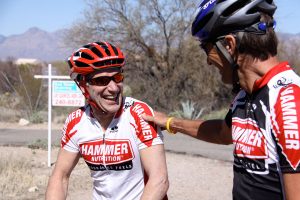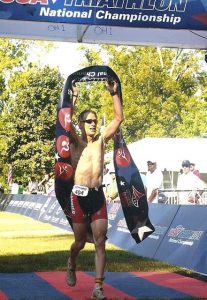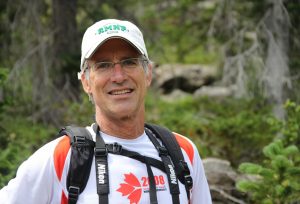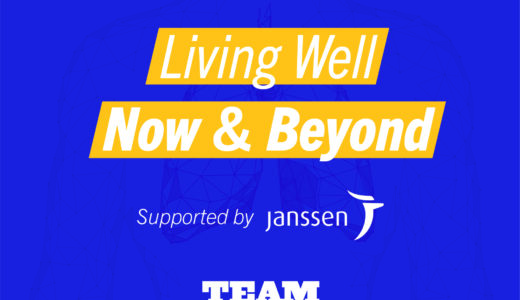Coach’s Blog: Training for the Race Across the West with Jim Bruskewitz

This blog post is part of our series devoted to the Race Across the West. In this article we interview Coach Jim Bruskewitz of Endurance Performance. He coached Team PHenomenal Hope in our successful 2014 4-woman team race, and again is a huge part of the behind-the-scenes help, coaching athletes Patricia George and Sara Harper as we push boundaries to go the distance again in 2015. We greatly appreciate all the support he has given and continues to give our team.
In this article, we would like to introduce you to Jim, and also dive a little more deeply into his coaching philosophy in training for ultra endurance events.

Team PH: Tell us about yourself. Where are you from, where do you live/work? When did you start racing? When did you start coaching? What types of athletes do you coach?
Coach Jim: I grew up in Elgin, Illinois and after high school enrolled at the University of Wisconsin-Madison. I earned 2 degrees in Madison and first taught in a small four-year college and later in the Kinesiology Department at the University of Wisconsin- Madison. I met my wife in graduate school and we raised two kids in Madison. Three years ago my wife and I moved to Boulder Colorado for the weather, for the outdoor experience, and for the lively, exercise enthusiastic community. My wife, kids, and I all live in Boulder now.
I formally started racing when I was seven years old. I focused primarily on swimming through college and then picked up the sport of triathlon in my mid-30s. I enjoy racing triathlons, swimming, cycling and running events. What I enjoy the most these days is training.
I started coaching swimming when I was a teenager. I continued to coach, but sporadically, until 1992. At that point I felt there was a need to help serious endurance athletes train efficiently for their events. I founded Endurance Performance to provide physiologic testing and training plans for endurance athletes. I have coached cyclists, runners, triathletes, and the occasional Nordic skier, canoeist, and rollerblader. I train energy delivery systems. Since the length of the planned event dictates which energy delivery system predominates, the training across disciplines has many similarities.
I also work for a company that manufactures a device with the trade name Compex. It is a neuromuscular electrical stimulation device. Basically it stimulates nerves in order to contract muscle. The repeated contractions will move blood very quickly, which makes it a great recovery tool, and can generate very forceful contractions if desired, which is a tremendous feature for re-educating unused or injured muscle.
Team PH: How did you get involved with Team PHenomenal Hope?
Coach Jim: I met Patty George at the Cycling House in Tucson, AZ for a week of cycle training and lots of fun. Patty was racing shorter road and mountain bike races at the time. We worked together until she transitioned to ultra cycling events. It wasn’t too long thereafter that we connected again to see what she could make of her new ultra endurance endeavors. When Patty joined Team PHenomenal Hope, I was thrilled to get involved which such a dedicated and talented group of women. Working with these women makes my role much easier.
Team PH: How did you approach preparing four athletes for the Race Across America last year, and how have you approached Race Across the West preparation this year? Do you have a coaching philosophy?
Coach Jim: Many years ago my brother clipped a headline out of some magazine and taped it to his refrigerator. Since I like to eat, I couldn’t help but see the headline over and over again. It read “train like a champion.”
I’ve always thought that those that have mastered their craft provide a proven road map to achieving a goal. We may not be as fast or capable of training and racing like the best of the best, but if we want to “win,” to reach our goals and enjoy the satisfaction that comes from working toward a goal, then we should approach it just like a champion does. It may be that one individual has certain strengths and weaknesses that should be taken into account. But I’ve also noticed that if the blend of intensities and volume are at the point where an athlete is challenged, and able to continue to challenge themselves while performing well on a daily basis, that there is no quicker way for the athlete to improve. There is a balance between work and recovery that should be struck. When it is, there can be an almost indescribable feeling one gets when they perform.
My job is to try and get each an every athlete on the team to this indescribable feeling.
There is no one formula for everyone. Even those that perform at the very highest level, season after season do not use the same formula. What is important is to follow sound training principles that can be found in any successful plan. That is the science if you will. The art is developing a plan that stays within bounds of the sound principles and can be most easily employed by the athlete. Once an athlete is on a roll, if they don’t get too greedy, then they are confident that what they are doing will give them the results they are looking for.
Team PH: What are the greatest challenges of an endurance/ultra-endurance athlete? Is it possible to train for an endurance/ultra-endurance event and maintain a full-time job?
Coach Jim: Just thinking about what RAAM and RAW will feel like can be mind blowing. When looking at it on paper, the first conclusion is that you can never do enough to really get ready for the event. I had a great coach that still speaks of “necessary and sufficient.”
There is a certain amount of training that is necessary to complete the goal event, and there is also a certain amount that is sufficient. Success comes when an athlete stays within those boundaries. It turns out that many overshoot sufficient to the point that they don’t perform as well as they could.
In the case of Team PHenomenal Hope, the team gets a bit anxious about whether or not these workouts they get will work for them. It’s a leap of faith. If one takes the emotion out of it, and exercise is ALL ABOUT EMOTION, then it is a bit easier to see that preparing by sitting on the bike hour after hour is not a critical feature, though a common one, of doing well in ultra endurance cycling events. The mind needs to know what the event can feel like. That is necessary. It is important to not be constantly surprised by what is unfolding when riding RAAM or RAW. There are other logistical details that require some concentration. Keeping the mind free of focusing on those things that can’t be controlled leaves room to focus on the things that matter.
Enough training can be done when it is wedged into a busy workweek. Knowing that you don’t have to get up in the middle of the night and ride with lights to do well in these events makes working and training a possibility. Certainly Team PHenomenal Hope proved that to be the case last year. I’m not saying that it isn’t difficult! It is difficult, but it is possible.
The longer the event, the more important are the mental aspects. The planning and logistics alone are pretty epic. Riding the bike day after day while trying to get the most out of the effort requires the body and mind to work as one. It is a huge challenge. If one is fit enough to not be overwhelmed by the physical challenges, then the mind can get some positive feedback and keep the body within its operating limits. It is a fascinating challenge. That fascination brings athletes back to the challenge again and again. Just look at Team PHenomenal Hope!






